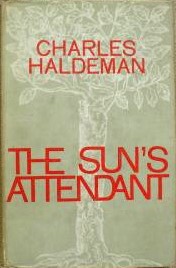
After receiving a long message from Charles Haldeman’s brother, Richard, in response to my piece on Charles’ second novel, The Snowman, I decided to try his first novel, The Sun’s Attendant, which received enthusiastic praise in the Times Literary Supplement:
To finish a new novel by an unknown author with a sense of complete satisfaction is rare. To come across one that compels instant second and even third readings is far rarer. The Sun’s Attendant suggests itself as something more than a fresh and accomplished work of fiction. It arouses the kind of puzzled excitement that can sometimes mark the entrance of an outstanding writer. At the very least, Mr. Haldeman has a most original mind and a set of unusual gifts.
Such praise raises questions: If true, how is it that The Sun’s Attendant has vanished from any critical account of 1960s American fiction, gone unnoticed after its initial release? Or did the reviewer simply get it wrong?
The Sun’s Attendant is nothing if not ambitious. Although it’s just over 300 pages long, it’s dense with difficult, challenging writing. Joyce, Gide, and, I suspect, Günter Grass, are noticeable influences. There is little conventional narrative that runs for more than a few pages.
As Marvin Mudrick described the book in his New York Review of Books review,
It is an enormous collage of fragments: isolated jokes, apothegms, parables, riddles, letters, notebook entries, newspaper articles, fairytales; a journal introduction, written in a clever pastiche of the high-collar rhetoric by which French intellectuals (even Camus) find it too easy to convince themselves of their sincerity (“My only hope is that in laying these strange pages in the hands of others, I shall perhaps have begun to reopen some long-closed windows in myself”); lengthy passages of interior monoloque; passages of stage-dialogue: each of the fragments headed by a title barely indicative, helpfully informative, or cryptically sardonic; abrupt dislocations from one character or milieu to another.
Haldeman also chose an overt and apparently symbolic structure. Subtitled, “A Diptych,” the book has two main sections–Left Panel and Right Panel, with a short linking section called Hinges. Each panel is divided into three sections named after positions of a planet as it orbits the sun: Summer Solstice; Aphelion; Autumn Equinox, etc..
All this deliberate artifice is meant to give weight and depth to the story of Stefan Brückmann, a half-German, half-Gypsy boy who is caught up in the turbulent history of Germany from the mid-1930s to the mid-1950s. Born to an itinerant Roma family, he loses his parents when their wagon falls through the ice while crossing a river somewhere in Central Europe. Taken in by his German uncle, he rebels against Nazi conventions and spends his time with other Roma and outcasts on the margins of Berlin.
Swept up in a late round-up of unwanted non-Aryans in 1943, he is sent to Auschwitz. On his sixteenth birthday, as he is about to resign himself to being sent to the gas chambers, he is yanked out of the huts thanks to his German bloodline and sent to be an attendant in one of the camp’s SS barracks. Stefan refers to the SS men as “the priests.” There, he is befriended by Hannes, a slender, blonde homosexual a few years older, who is also working in the barracks.
 As the Russians approach, Stefan and Hannes are moved, along with other inmates, towards the West. They manage to escape when an Allied plane attacks their train, causing it to derail, but Hannes is wounded and soon dies. Stefan is interned again, this time by the Americans, as a displaced person. An American G.I., a Southerner named Moon (more symbolism), takes a liking to Stefan and eventually adopts him. After a brief spell in South Carolina, full of atmosphere straight out of Faulkner and Flannery O’Connor, Stefan returns to Europe.
As the Russians approach, Stefan and Hannes are moved, along with other inmates, towards the West. They manage to escape when an Allied plane attacks their train, causing it to derail, but Hannes is wounded and soon dies. Stefan is interned again, this time by the Americans, as a displaced person. An American G.I., a Southerner named Moon (more symbolism), takes a liking to Stefan and eventually adopts him. After a brief spell in South Carolina, full of atmosphere straight out of Faulkner and Flannery O’Connor, Stefan returns to Europe.
In Paris, he meets up with a French intellectual, Immanuel de Bris, who ends up taking him along on a lecture trip to Heidelberg. There, de Bris introduces him to Barbara Speer, recently widowed by the suicide of her husband, a promising young poet and critic. The twists and turns of Stefan and Barbara’s relationship, as they come together, wring hangs over their respective losses, encounter various artists and intellectuals in postwar Germany, part, and, finally, come to some kind of reconciliation, fills the second half of the book (Right Panel).
I stuck with Haldeman to the very end of The Sun’s Attendant out of simple faith in his artistic aims. He did not set himself an easy task. He clearly wanted to take on profound questions about life and death, playing out his story against a backdrop where death is everywhere and on a large scale. And he lacked no courage when it came to embracing absurdity. Great personalities come to ridiculous ends in his story. And the reader regularly gets exposed to short bursts of what I can only suppose is meant to be purely absurdist prose:
Merchants are no longer sure of Canada: its puppet strings were snipped by Vichy scissors. Spectacles, hats and rings went down with boots.
Only the blank uncounted Sunday flies fill their ears like inedible puddings.
Swollen prunes and spilt milk mingle with the natal flow and the honey of Canaan.
As well as great clumps of weighty thoughts:
But just as life, as a wound, depends on death, as a body, for its sustenance, Man himself could not begin to realize himself until his fall had wounded Eden. Man will return at once to his original home, which has never ceased to exist, in the very moment that his wound becomes irreversible–that is, when life is no longer healable by death.
There’s a little of everything here: Brechtian dialogues, rabbinical , dry analyses auf die Akademie, pensees worthy of Satre’s review, Les Temps modernes, Gypsy folktales, even snatches straight out of Kerouac:
I began to wander, from town to town, always farther inland. I reached the Rockies and, repelled by them, turned southward and back. Two years I drifted, sometimes working, mostly not. I avoided trains and seldom hitchhiked; usually I took buses, with endless accordion tickets, go off in unlikely places, stayed an hour or a day and go back on, in and out of a kind of sleep-read-sleep-talk-stop-start-sleep, on and on through the slow transitions, the wastes, the geographical paradoxes, the dry primitivity, through the inexplicable familiarity, freak electricity and sudden clarity, the named placelessness of the American continent, transported by an absurd, fluid, heart-breaking dream of distance.
Do all these fragments amount to something as significant and serious Haldeman seems to have intended it to be? Serious–yes. As Stanley Kauffmann wrote in his review for the New York Times, “We are always conscious of the author’s utter seriousness of purpose, that he is less engaged in display than in the fulfillment of his themes.”
 Significant, though? Sadly, The Sun’s Attendant suffers from the tendency of many inexperienced writers to mistake serious for profound. Giving Stefan Brückmann an interesting story does not make him an interesting character. The book’s end comes as a relief, not a revelation.
Significant, though? Sadly, The Sun’s Attendant suffers from the tendency of many inexperienced writers to mistake serious for profound. Giving Stefan Brückmann an interesting story does not make him an interesting character. The book’s end comes as a relief, not a revelation.
As Kauffmann put it, “[W]hat we are left with is the work of a young writer … who is able and attractively ambitious but who has attempted subjects not yet within his grasp.” Mudrick reached much the same conclusion: “The energy of the novel dissipates itself in local effects–comments, technical surprises, aphorisms, short-lived intellectual fireworks of impressive diversity and inventiveness–and nothing is left for the long run.”
After finishing The Sun’s Attendant,I picked up another of Eric Hatch’s novels, Road Show, and the contrast reminded of Coleridge’s line about Fielding (“To take him up after Richardson, is like emerging from a sick room heated by stoves, into an open lawn, on a breezy day in May”). I can’t imagine turning back, like the TLS critic, for a second and third read of Haldeman’s book. But then the TLS’s man may have been a better reader than I, Gunga Din.
I will not, however, give up my faith in Mr. Haldeman. I have ordered his last novel, Teagarden’s Gang, which, according to his brother Richard, “was unable to find an American publisher because a main character was too closely identified with J. Edgar Hoover, still powerful and living.” Written ten years after The Sun’s Attendant, it may just deliver on his promising ambitions.
Find a Copy
- Find it at Amazon.com: The Sun’s Attendant
- Find it at Amazon.co.uk: The Sun’s Attendant
- Find it at AddAll.com: The Sun’s Attendant

The book has been translated into German 2015 at Metrolit, also published presently by Büchergilde.
Thanks for this insightful article. However, I am one of the people who have read The Sun’s Attendant three times and am not going to leave it at that. Ever since I found Haldeman’s book by chance in a Paris secondhand bookstore, I have been haunted by his compelling voice (italics). This voice, its power and stamina, seldom congenial, is what stays with me. There is plenty to criticize in this book, for sure, but why be picky? Reading it is an experience in itself. I would like to see this book translated into German and have just lent it to a writer friend to read in the hopes that he can use his connections to this end. I would appreciate any information as to how to contact his brother or family.
Hello
I wrote about _The Sun’s Attendant_ a couple of decades ago, and one chapter of my book _Nachkriegsdeutschland im Spiegel amerikanischer Romane der Besatzungszeit_ (Tübingen: Narr, 1994) is devoted to that interesting roman-à-clef about Rainer Maria Gerhardt, a friend of Robert Creeley’s.
You mentioned in your review that Haldeman has a brother called Richard. Do you still happen to have Richard’s e-mail address? I would like to get in touch with him about Haldeman’s German family connection.
Looking forward to hearing from you.
Yours sincerely,
Martin Meyer